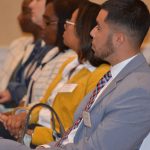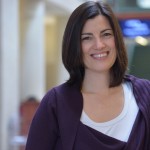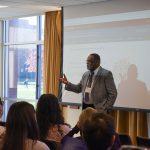More than 60 Neag School alums, students, faculty, and administrators, along with education professionals from across Connecticut, gathered last month for an evening of networking, followed by a panel discussion at the Darien Community Association in Darien, Conn. This year’s forum, held for the first time in Fairfield County, was hosted by Neag School Dean’s Board of Advocates members James Degnan ’87 (CLAS) and Elizabeth Degnan ’87 (CLAS).
There’s an Olympian spending time at the University of Connecticut right now and, if you think it’s a Husky basketball player, you are wrong.
The athlete is Karen Chammas, who represented her native Lebanon in the sport of judo at the 2012 London games, and she is spending late October and early November in Storrs as part of the Global Sports Mentoring Program.
There’s an Olympian spending time at the University of Connecticut right now and, if you think it’s a Husky basketball player, you are wrong.
The athlete is Karen Chammas, who represented her native Lebanon in the sport of judo at the 2012 London games, and she is spending late October and early November in Storrs as part of the Global Sports Mentoring Program.
In partnership with a consortium that includes six other universities across the nation, the Neag School’s special education doctoral program and Center for Behavioral Education and Research (CBER) will once again be part of a federal grant designated to support a total of nearly 30 future scholars in the field of special education.
Director of the UConn A.J. Pappanikou Center for Excellence in Developmental Disabilities Education, Research, and Service (UConn UCEDD), Mary Beth Bruder has received a $6.5 million grant from the U.S. Department of Education to develop a doctoral leadership program to train 28 future faculty. These trainees will then design and teach courses and programs of study designed to prepare teachers, social workers, and therapists to provide specialized interventions to infants and young children with intellectual and developmental disabilities and their families.
There is a lot of research on teachers’ use of waiting in the classroom and the positive effects it can have for student engagement and learning. The best news of all? Improving student learning only takes 3 seconds.
It gets harder and harder to treat dyslexia in children with every year that passes after preschool. Problem is, most kids don’t get diagnosed until they’re around 8 years old. Dyslexia particularly hard to detect in English-speakers, and teachers usually only recognize it once a child fails. That’s why researchers from three universities got together to make an app that will help teachers detect dyslexia in kids at an earlier age.
Approximately 70 school, behavioral health, community, and research leaders from across the state gathered at the University of Connecticut campus in Storrs on Wednesday, Oct. 23, 2019, to discuss school and community responses to childhood trauma and how to align work around trauma-informed schools in Connecticut.
“Colleges place significant weight on a student’s grade point average, class rank, and standardized test scores in the admissions process,” says Clewison Challenger. “For decades, these measures have informed how K-12 schools design curricula and counsel students on college readiness. Yet grades and SAT results alone are ineffective predictors of students’ college success.”
Hazing and heavy drinking have been taking place at American colleges and universities for decades. Death has been a constant companion. New fraternity members at U.S. colleges and universities have died at an average rate of one per year for the past 50 years. Ten have died in the past three years. At least six hazing deaths since 2017 were alcohol-related.





